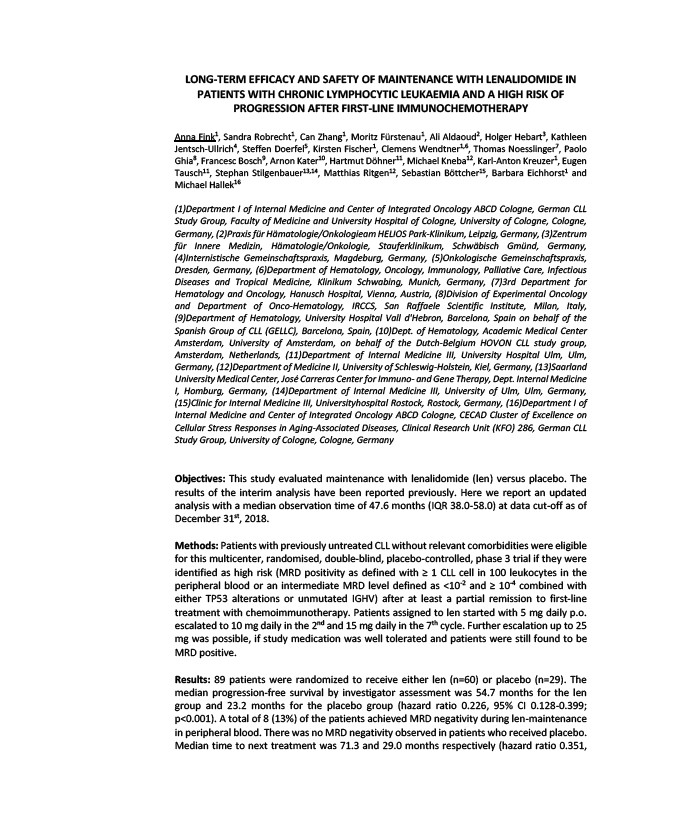
LONG-TERM EFFICACY AND SAFETY OF MAINTENANCE WITH LENALIDOMIDE IN
PATIENTS WITH CHRONIC LYMPHOCYTIC LEUKAEMIA AND A HIGH RISK OF
PROGRESSION AFTER FIRST-LINE IMMUNOCHEMOTHERAPY
Anna Fink1, Sandra Robrecht1, Can Zhang1, Moritz Fürstenau1, Ali Aldaoud2, Holger Hebart3, Kathleen
Jentsch-Ullrich4, Steffen Doerfel5, Kirsten Fischer1, Clemens Wendtner1,6, Thomas Noesslinger7, Paolo
Ghia8, Francesc Bosch9, Arnon Kater10, Hartmut Döhner11, Michael Kneba12, Karl-Anton Kreuzer1, Eugen
Tausch11, Stephan Stilgenbauer13,14, Matthias Ritgen12, Sebastian Böttcher15, Barbara Eichhorst1 and
Michael Hallek16
(1)Department I of Internal Medicine and Center of Integrated Oncology ABCD Cologne, German CLL
Study Group, Faculty of Medicine and University Hospital of Cologne, University of Cologne, Cologne,
Germany, (2)Praxis für Hämatologie/Onkologieam HELIOS Park-Klinikum, Leipzig, Germany, (3)Zentrum
für Innere Medizin, Hämatologie/Onkologie, Stauferklinikum, Schwäbisch Gmünd, Germany,
(4)Internistische Gemeinschaftspraxis, Magdeburg, Germany, (5)Onkologische Gemeinschaftspraxis,
Dresden, Germany, (6)Department of Hematology, Oncology, Immunology, Palliative Care, Infectious
Diseases and Tropical Medicine, Klinikum Schwabing, Munich, Germany, (7)3rd Department for
Hematology and Oncology, Hanusch Hospital, Vienna, Austria, (8)Division of Experimental Oncology
and Department of Onco-Hematology, IRCCS, San Raffaele Scientific Institute, Milan, Italy,
(9)Department of Hematology, University Hospital Vall d'Hebron, Barcelona, Spain on behalf of the
Spanish Group of CLL (GELLC), Barcelona, Spain, (10)Dept. of Hematology, Academic Medical Center
Amsterdam, University of Amsterdam, on behalf of the Dutch-Belgium HOVON CLL study group,
Amsterdam, Netherlands, (11)Department of Internal Medicine III, University Hospital Ulm, Ulm,
Germany, (12)Department of Medicine II, University of Schleswig-Holstein, Kiel, Germany, (13)Saarland
University Medical Center, José Carreras Center for Immuno- and Gene Therapy, Dept. Internal Medicine
I, Homburg, Germany, (14)Department of Internal Medicine III, University of Ulm, Ulm, Germany,
(15)Clinic for Internal Medicine III, Universityhospital Rostock, Rostock, Germany, (16)Department I of
Internal Medicine and Center of Integrated Oncology ABCD Cologne, CECAD Cluster of Excellence on
Cellular Stress Responses in Aging-Associated Diseases, Clinical Research Unit (KFO) 286, German CLL
Study Group, University of Cologne, Cologne, Germany
Objectives: This study evaluated maintenance with lenalidomide (len) versus placebo. The
results of the interim analysis have been reported previously. Here we report an updated
analysis with a median observation time of 47.6 months (IQR 38.0-58.0) at data cut-off as of
December 31st, 2018.
Methods: Patients with previously untreated CLL without relevant comorbidities were eligible
for this multicenter, randomised, double-blind, placebo-controlled, phase 3 trial if they were
identified as high risk (MRD positivity as defined with ≥ 1 CLL cell in 100 leukocytes in the
peripheral blood or an intermediate MRD level defined as <10-2 and ≥ 10-4 combined with
either TP53 alterations or unmutated IGHV) after at least a partial remission to first-line
treatment with chemoimmunotherapy. Patients assigned to len started with 5 mg daily p.o.
escalated to 10 mg daily in the 2nd and 15 mg daily in the 7th cycle. Further escalation up to 25
mg was possible, if study medication was well tolerated and patients were still found to be
MRD positive.
Results: 89 patients were randomized to receive either len (n=60) or placebo (n=29). The
median progression-free survival by investigator assessment was 54.7 months for the len
group and 23.2 months for the placebo group (hazard ratio 0.226, 95% CI 0.128-0.399;
p<0.001). A total of 8 (13%) of the patients achieved MRD negativity during len-maintenance
in peripheral blood. There was no MRD negativity observed in patients who received placebo.
Median time to next treatment was 71.3 and 29.0 months respectively (hazard ratio 0.351,